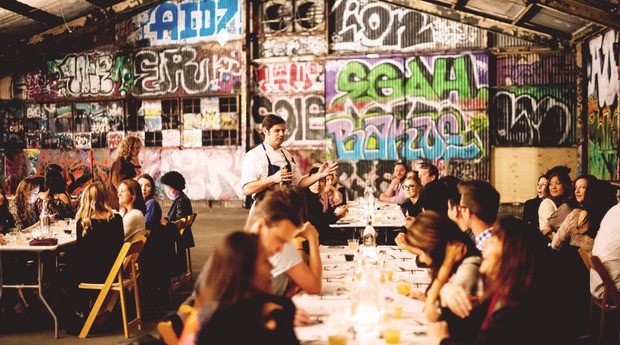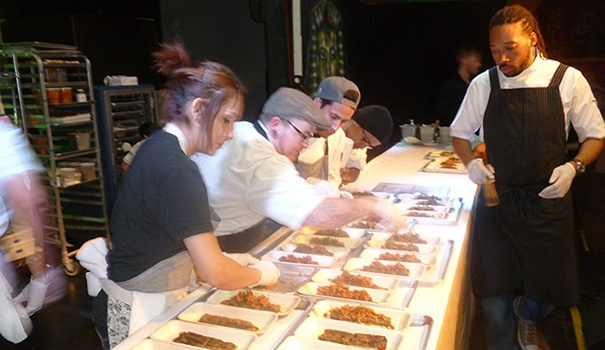How Dinner Lab’s Attempt to Crowdsource Restaurant Concepts Got Roasted

Founded in 2012, Dinner Lab was an innovative startup that raised over $10 million in funding, gained over 150,000 members, and had a presence in almost 30 cities.[1] Despite this tremendous growth and demonstrated consumer interest, the company abruptly shut down in 2016. So, what happened?
What They Did
As a former member of Dinner Lab myself, I distinctly remember how a friend first pitched it to me: “It’s like a cool secret supper club where you get a tasting menu and open bar for a fixed price in a really cool venue in the city.” It was an easy sell for foodies and wannabe-foodies, alike. In exchange for paying an annual membership fee of approximately $150, a diner gained access to sign-up for pop-up dinner parties held every couple of weeks in surprising locations throughout a city (like a helipad). Each meal cost around $65 per person and featured the culinary expertise of an up and coming chef seeking to develop a restaurant concept.[2] 
So what is the value creation for chefs? The Dinner Lab concept allowed sous-chefs from top restaurants to crowdsource opinions on their dishes and restaurant concepts before taking the risk of opening a new permanent establishment. Diners were required to fill out a detailed survey at the end of each meal summarizing their reactions to each dish and the overall dining experience. The data was shared with the chefs, which allowed them to discern general and market-specific consumer preferences and further refine the concept. The idea was that ultimately, the crowd-generated feedback would increase the likelihood of success for a start-up restaurant by making the process more of a science than an art. In fact, in describing its effort to generate the first crowdsourced restaurant ever, CEO Brian Bordainick said, “we believe we can normalize data from thousands of people across the U.S. and get a restaurant to maximize their meals in the market.”[3]
Apart from charging members for an innovative dining experience, Dinner Lab also planned to capture additional value through monetizing its aggregated data across its operations. For example, by analyzing event sign-up data (i.e. speed of sell-out), Dinner Lab could discern taste trends for different types of cuisines by geography. Additionally, it could parse out demographic data to determine different market segment preferences. This wealth of data could potentially be very valuable to third parties other than partner chefs, such as current restaurant owners.
Why They Failed
Despite the promising value capture opportunities, Dinner Lab suddenly folded in mid-2016. While a couple of Dinner Lab veteran chefs have gone on to have successful careers (i.e. Kwame Onwuachi on Top Chef), the promised crowdsourced restaurant never came to fruition and disappointed diners were left wondering what went wrong.[4]
- Business Model: Dinner Lab could not capture enough value from diners to offset complex
 operations. The company planned to have membership fees cover corporate overhead and at least break-even on the events. As each event was different and required new ingredients, staff, and logistical and regulatory hurdles, the venture was not able to profitably scale and ended up “bleeding cash.”[4]
operations. The company planned to have membership fees cover corporate overhead and at least break-even on the events. As each event was different and required new ingredients, staff, and logistical and regulatory hurdles, the venture was not able to profitably scale and ended up “bleeding cash.”[4] - Value Capture: Dinner Lab overestimated the value of its crowdsourced data and was unable to monetize it with third parties. The CEO subsequently admitted, “We operated under the assumption that the information we gathered was extremely valuable. But it turned out most restaurants have menus they’re already happy with.”[4]
- Industry: The restaurant business is much more of an art than a science and attempting to let data drive decisions is not rational. In high-end dining, a small subset of influencers, such as The New York Times critics, still dictate market acceptance. Given that the success of restaurants is dependent on many more variables than simply alignment with diner preferences – location, marketing, cache of owners, etc. – this industry wasn’t the ideal candidate for crowdsourcing.
Despite having a great idea and gaining scale and adoption, Dinner Lab represents an ominous example of overestimating the value of a crowdsourced platform and underestimating the capabilities necessary to scale a crowd-based business model.
[1] http://nola.eater.com/2016/5/25/11768860/why-new-orleans-supper-club-dinner-lab-failed
[2] https://techcrunch.com/2015/08/06/dinner-lab-raises-a-7m-series-a-to-expand-its-social-dining-club/
[3] http://www.businessinsider.com/dinner-lab-creates-data-restaurant-2014-3
[4] https://www.forbes.com/sites/forbestreptalks/2016/05/24/how-dinner-lab-blew-through-10-million-on-a-failed-restaurant-startup/#a069b40c64ac



Ah I would love to sign up for something like this! In reflecting on why they failed, my sense is that crowdsourcing works well when your variable cost to “serve the crowd” is near zero. This is because the value always lies in the data or knowledge that can be captured from the crowd, so you want as large a crowd as possible. However, if the marginal cost for every additional crowd member is high, it is difficult to scale and realize the benefits from the group. I wonder if an alternate model for this business would be to simply get feedback on different menu items and restaurant concepts online, without creating the actual dining experience – this would make their cost to serve large crowds almost zero and any value captured would be pure profit?
Thanks for the comment! I think your proposal would certainly be more efficient from a business model perspective but I’m not exactly sure how they would capture value in this scenario. I strongly doubt members would pay for this experience but perhaps Dinner Lab would be able to amass enough data that could be more successfully monetized via third parties. Regarding fixed vs. variable costs, my view is that Dinner Lab didn’t fail in attempting to spread costs over a a group of users (once an event was scheduled, one additional meal would only require marginal cost), but the fixed costs were simply too high for each event.
Great post and sad to see this cool business concept go! The question of art vs. science is an intriguing one. What is the value of data in an art-driven industry and can data be truly helpful? Can crowds and data be leveraged to help mitigate development risk in these types of industries? But do crowds even know what they want? It seems like data isn’t going to influence these chefs / creators, and the most valuable part for them is to be in the same room as those experiencing their cooking and watch their real-time reaction. The job for these creators is to continue to delight and impress, to innovate and give consumers an experience they don’t know exists yet. This is naturally at odds with using data, which is backward-looking, can only explain current preferences, and limited by consumer knowledge
Thanks for commenting – I agree with your points. I think in high-end, creative businesses (fine dining, fashion, art, etc.), data is much less useful as (1) many consumers may not know what they want and (2) consumers are highly influenced by unscientific sources. Perhaps if Dinner Lab had focused on a more functional dining experience – for example, attempting to crowdsource the next QSR restaurant chain concept – the data would have been more meaningful and useful.
Wonderful post, Christy – I’m really bummed to hear that they folded!
I’m curious if there’s an opportunity to continue to experiment in a low stakes manner and get comprehensive feedback from customers. I know there are “chef/restaurant incubator” concepts, like City Grit in NYC and Wink and Nod in Boston, that feature guest chefs and changing menus. Do you think Dinner Lab could reinvent itself, so that high-cost logistics could be reigned in (i.e. real estate, staff, regulatory, etc.), while still providing a platform for guest chefs to crowdsource feedback? Maybe it would look something like a “chef incubator” but with a membership and post-meal evaluations? Just an idea…
Great point! I definitely agree that Dinner Lab got too big too fast. While more cities perhaps helps grow the brand, it offers no additional value to current users and is arguably not useful to chefs either as they can only open their first restaurant in one market. Focusing solely on one robust market like NYC could have allowed them to achieve a more efficient cost structure – for example, signing a deal with a real estate company to rent out 10 vacant spaces in order to drive down rental cost or bulk ordering from local food providers to secure volume discounts. Dinner Lab’s success in gaining paying users clearly demonstrates demand for a test kitchen concept. The tricky part is building a business model that effectively leverages the crowd feedback and efficiently creates the premium experience.